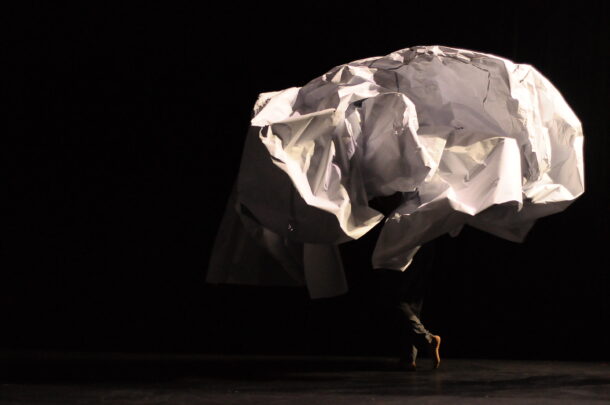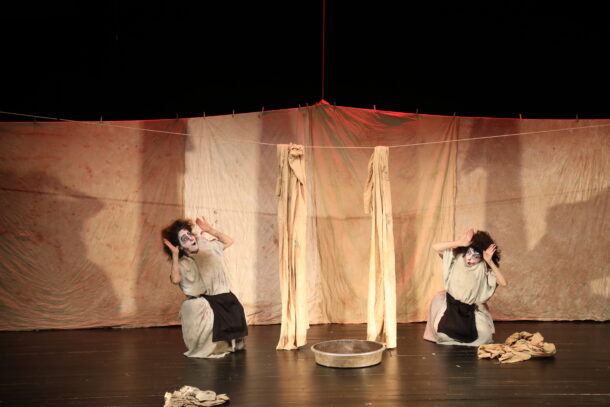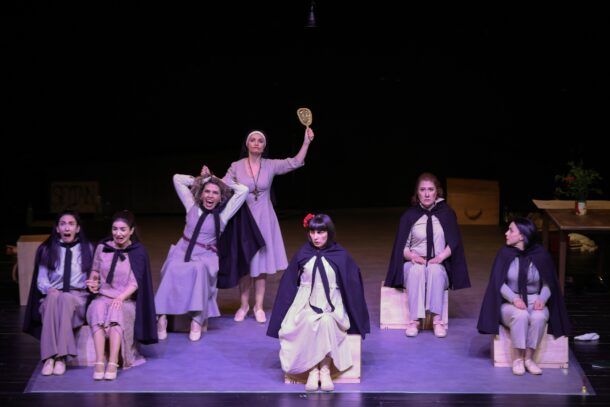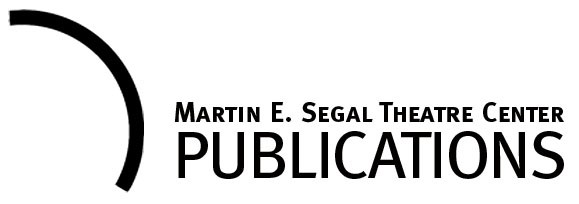By Verity Healey
In May 2022 UK theatre writer Verity Healey was invited to attend TheatreIST, a new independent theatre showcase in İstanbul. TheatreIST was brainchild of the late Ragıp Ertuğrul—a well-known and much-loved and respected playwright, critic, and director who sadly passed away in July of 2022. As Ragıp’s illness also prevented him from continuing to organize TheatreIST, A group of theatre colleagues and academics including Handan Salta, Zerrin Yanıkkaya, Nihal Kuyumcu, Hasibe Kalkan, Senem Cevher and Gökay Genç (playwright and co-founder of Rest Tiyatro with Ragıp) hurriedly took over Ragıp’s responsibilities. TheatreIST under their direction opened with thirteen performances, talks, panels, invited academics, journalists, and a wide range of festival directors and curators, from Canada to Israel. In late July Healey interviewed Salta to chat about the philosophies behind the showcase. Their conversation follows:
Healey: Can you describe the situation in Turkey today for theatremakers, especially independent ones?
Salta: Independent theatres have been in dire straits more than ever in the last ten years. After the Gezi protests in 2013, there was an increase in censorship, a decrease in subsidies, and a general invalidation, defaming, and trivializing of the arts, including the performing arts. Yet despite this, there has been a flourishing in the number of theatre companies and performances in Turkey. This is quite ironic and it says a lot about the need for self-expression and the importance of theatre in Turkey. Gezi started a movement that spread rapidly across the country and brought some fresh air to those who were suffocated by the oppression in every aspect of life. Although many people had to leave the country due to the Gezi protests and the suppression, killings, ever-intensifying oppression and worsening economic crisis since then, it is still a milestone for the country’s history of rebellion, search for freedom of all kinds and solidarity. Since Gezi, feminist groups, LGBTQI activists, Kurds, workers and the media have restored people’s courage and showed solidarity despite all the odds. This turning point was naturally reflected in theatre performances and new independent theatres have been inviting, calling for and meeting their own audiences since then.
When we think of Gezi we have to keep one more thing in mind; by its nature, Gezi was a performative movement, there were concerts, dances, and performances during the protests in the park and other performative protests in the streets and on social media. The tone of the protests and slogans were witty, cheerful and unlike the usual, monotonous, old and stereotyped ones of the past. It paved the way for artistic forms of expression in a highly political movement. So, with the quest for a new language with humour, courage for self-expression and solidarity against all odds, the legacy of Gezi is still among us in different forms. This performative character of Gezi is still the brightest reminder of those days that brought hope to people who were protesting.

Sar. Photo: TheatreIST
Healey: Can you explain the initial inspiration and motivation behind TheatreIST? Why now? Why Istanbul? Is the showcase itself a quest to help show off or find new theatrical languages?
Salta: Under the circumstances already mention and the effect of the covid pandemic, the independent theatre sector needed a means of sustainability, and we thought a showcase would open doors to those groups who could not establish connections with festivals abroad. Ragıp (Ertuğrul) came up with the idea for TheatreIST initially.-IST of course means İstanbul. Let me say a few words about Ragıp here. He had been the chairman of Theatre Critics Association of Turkey for three terms and he always had new ideas. Being a creative and quick-witted person, Ragıp was always on the move and thanks to his big heart and elegant character he had a large network. When he came up with this showcase idea it felt like a dream to me and I liked it very much. In a very short time he managed to find sponsors, gathered us together and we were off to a rapid start. TheatreIST was and is an invitation to review or alter (though not necessarily change) perceptions of/in Turkey. It might seem like a depressing and dark country when looked at from outside but there is a very vivid art scene going on here. So naturally, it seemed like a good idea to make that scene visible and invite international guests especially. We were quite short of time because one of our main sponsors TGA (Tourism Promotion and Development Agency) wanted to combine the showcase with another festival they were sponsoring (Beyoğlu Kültür Yolu ). Then the İstanbul Metropolitan Municipality agreed to pay the fees for the theatre groups and İstanbul Municipality Theatre and Bahçeşehir University Conservatory– BAU Pera–agreed to offer their venues for a few days– but that was all we had. Looking back, it seems incredible that we made it work by the way, it was a good time to invite people to İstanbul season-wis)e. Anyway, Ragıp was the one taking care of all the sponsors regarding travel expenses, accommodation, venues, fees for the teams and dinners etc. When Ragıp got sick we had to take over those responsibilities and since we had no experience of such things we faltered but tried to do our best.
The idea to combine the showcase with conferences and a panel came later. Many of the International guests stated that the panel on theatre in Turkey gave them an important historical context. We decided on İstanbul as the location because it is the center of all Turkish artistic creation. However, the main purpose for the showcase is to play a role in making the independent theatres visible, and known outside Turkey. We hoped that an event like the showcase would give theatre people more incentive to be heard and take pride in their work.

Under the Castle. Photo: TheatreIST
Healey: I feel, although this may be accidental because of Ragıp’s illness, that the festival was definitely female-led. Is this a conscious/unconscious effect from Gezi Park for instance and the fact that women, not just in theatre, but across society, started to find increased solidarity with each other?
Salta: Yes, this event is led by women and I am happy to be working with them. The realm of theatre (criticism and academia especially) is populated if not dominated by women in Turkey anyway. Of course, Gezi has had an accelerating role in encouraging women to speak out, but it would be ignoring the influence of a very strong feminist movement in this country to connect this situation to Gezi only. The fourth wave of feminism started along with the coup in 1980 and attracted a lot of women. Thanks to activism, consciousness-raising, and academic work, the feminist perspective and practice have been on stage for a long time, especially among the independent theatre people.
As for theatre criticism being female-led; female voices in theatre performances brought out or gave life to female-led criticism as well. A few years ago four women (Eylem Ejder, Tijen Savaşkan and Zehra İpşiroğlu and myself) spearheaded a project called “Feminist Seyir” (Seyir means both watching and journey) to assess the plays about/for/by women in a dialogue form. In another project, Kritik Kolektif, conducted by Eylem Ejder and myself, we searched for creative, collective and artistic ways of writing criticism with non-professionals, theatre academics and artists and the participants were mostly women—there was one male writer out of twenty-two. Also, members of the Turkish theatre critics association are mostly women.

Yaftalı Tabut. Photo: TheatreIST
Healey: A common thematic trend in the festival was the representation of history, oppressed events and figures important to Turkish growth as a state. Memory and fantasy and imagined futures were also common in shows such as Zabel, Unsung Blues, Sar, Gomidas and Yaftalı Tabut in particular. Why is it important now for independent theatre-makers especially to confront Turkey’s past? Do you think there is a danger that theatre-makers could get stuck there or do you think it is symptomatic of growth, and that theatre has to go through this as a natural part of distancing itself from the state and setting about forming its own identity?
Salta: For a moment I wanted to start, “It might be because of the performances we chose…” but I immediately dismissed the idea because it has been a rising trend in the last twenty years in theatre here. Along with the governing party (the AKP) coming to power, the main philosophies behind the Turkish republic like secularism, a Westward looking perspective, and Western way of living, were questioned, criticized, and looked down on by the government. Being “local and national” (yerli ve milli) has been favoured, and folkloric values have been given priority which have all led to more polarization in society. Also, questioning secularity was the first issue on the list, and a “new Turkey” was designed, engineered and shaped with the wave of New Ottomanism that had started during the term of Turgut Özal, the leader of the governing party after the coup in 1980. At the same time when AKP came to power in 2002 a relative peace process with the past was initiated; there were talks with the Kurds, and peace between religions was a dominating discourse of the government. The army was losing its power over politics and a relatively liberal atmosphere was emerging. Although things went totally in a different direction later on—and it is the subject of another article or a book–once the confrontation started, it went on to a process of going deeper, not only in theatre but in other forms of art and in our daily lives. Theatre and dance performances staged after that time have a certain emphasis on issues that were ignored, or neglected before. Confrontation with the past came along with its own form of narrative. This quest for confrontation with Turkey’s history is not limited to small independent companies either; Yaftalı Tabut is a production by İstanbul Municipality Theatre and bigger companies are also interested in this confrontation process and its practices. Confrontation with the past also helps to shed light on the present day because directly questioning the present is highly risky.
The answer to the second question is a big no. Theatre will not get stuck there because this is a very dynamic society and theatre people will never be short of concerns or conflicts. And because a lot of these issues, which have a direct connection with the present, have been swept under the carpet, we have a lot to confront, repair, think, meditate, laugh, cry over, mourn, memorize, re-establish, forgive and celebrate.
Healey: What voices are being missed that you would like to see theatre-makers including? If Turkish theatre looks too inward, is there a danger of insularity? For instance, a lot of independent theatre-makers come out of the universities and conservatoires which can be expensive to attend—what needs to change in order to include minority voices and other groups in Turkey?
Salta: Of course, there are several shows we did not include in the program but this year we were quite late planning and running the showcase. Some performances we wanted to include were not available for different reasons. Some were not suitable for watching with subtitles. We need more planning for next year. Our foremost concern and interest were related to professional companies who are still making theatre and in need of being seen. The post-covid situation has made life harder for performance artists (along with live-music performances) in Turkey and many theatre companies do not have their own venues, so they tour around the stages in İstanbul; sometimes you play hide-and-seek with a performance you really want to see. The fact that there are more than seventeen acting/theatre schools in İstanbul makes it more challenging to choose among when there are about 200 performances every night in İstanbul. Then again we started with a limited number of performances and tried to provide space for every genre.
Healey: At the opening panel, a theatremaker from Georgia claimed that Turkish theatre-makers weren’t great at collaborating across borders with international partners and it was suggested that critics in Turkey could help/encourage theatre-makers to try and look outwards more. How do you see the critic’s role in Turkey, and are critics generally supportive of independent theatre or is there a reluctance to engage?
Salta: The Theatre Critics Association has been giving awards to independent theatres as well as to subsidized or more established ones. The international theatre festival held by Istanbul Culture and Arts Foundation (IKSV) since 1989 has also platformed several collaborative projects and has opened up space for independent companies. Considering the number of critics on the organizing committee of TheatreIST Showcase we cannot say that critics are reluctant to engage in independent theatre. Additionally, one of the aims of this showcase is to lead future collaborations and establish international links.
Healey: Please give a sense of the impact the festival has had on makers, students, and Turkish citizens.
Salta: As I have said, our first motive in organizing this showcase was to introduce independent theatre companies to international audiences. Lack of subsidies, the economic crisis, and covid-related sanctions put those theatre people in a very difficult position financially. Also, the cultural atmosphere has been getting barren due to a brain drain and other policies that art and culture are suffering from. This is the first time in the history of Turkey that independent theatres have met international festival organizers officially and they got useful feedback. I believe that post-show talks also helped the theatre makers and young theatre people who attended them. As a side activity to the showcase, we organized a theatre criticism workshop which was attended by theatre students, young actors, and people working in culture-related areas. They had the chance to see all the performances and take part in the post-show talks where academics, critics, and festival curators from different parts of the world voiced their views. One of our volunteers was offered a volunteer job at the Sibiu festival. Many of the performances got very good reviews and were invited to The International Theatre Festival in Sibiu next year. Slovakia will be the hosting country for independent performances in 2024. We are also in the process of running a reciprocal translation project of plays. The showcase was not open to the public but reviews, interviews, and articles have been written and published by eminent journalists, critics, and academics, theatre people and audiences here will be informed about the showcase.
Healey: I am interested in the term “witnessing” used to describe the audience’s experience of watching a show. I never hear this in the UK, although I was recently working with some migrant theatre-makers at the Royal Court in London, and this term was important to them. Can you describe why it is important in this context? It is a term a lot of Turkish young theatre makers used too.
Salta: When I use the word “witnessing” I mean something bigger than being an audience only. Sometimes when I observe the reactions from the audience or overhear people talk enthusiastically about a show I understand that the performance has touched their soul and they have just witnessed something rather than merely spending a night at the theatre. In my opinion, the audiences at the showcase and post-show talk session were witnessing the event since it was a very important moment.
Healey: What are your hopes for next year’s edition?
Salta: Next year we are already planning to work with an advisory committee when choosing the performances and enlarging the showcase by adding performances from other cities if we are supported financially. We would love to have masterclasses, panels, and talks. Talk-back sessions can be reshaped as well. The feedback session at the end of the showcase was quite fruitful for us, and we will consider all the suggestions.

European Stages, vol. 17, no. 1 (Fall 2022)
Editorial Board:
Marvin Carlson, Senior Editor, Founder
Krystyna Illakowicz, Co-Editor
Dominika Laster, Co-Editor
Kalina Stefanova, Co-Editor
Editorial Staff:
Asya Gorovits, Assistant Managing Editor
Zhixuan Zhu, Assistant Managing Editor
Advisory Board:
Joshua Abrams
Christopher Balme
Maria Delgado
Allen Kuharsky
Bryce Lease
Jennifer Parker-Starbuck
Magda Romańska
Laurence Senelick
Daniele Vianello
Phyllis Zatlin
Table of Contents:
- AVIGNON 76. A Festival of New Works by Philippa Wehle
- Almodóvar’s Women on the Verge in Portugal by Duncan Wheeler
- BRACK IMPERie. About “Hedda Gabler” by Vinge/Müller at Norske Teatret Oslo by Thomas Oberender
- Embodied Intimacy: The Immersive Performance of The Smile Off Your Face at Edinburgh by Julia Storch
- Fear, Love, and Despair – Radu Afrim: Director of Core Feelings by Alina Epîngeac
- Grec Festival de Barcelona, July 22 by Anton Pujol
- I Think of Curatorial Work in Scholarly Terms: An Interview with Ivan Medenica by Ognjen Obradović
- New Worlds Revealed in an Immigrant Journey, and an Unexpectedly Meaningful Universe Discovered and Destroyed Inside Styrofoam, at the Edinburgh Festival by Mark Dean
- Participation, Documentary and Adaptation: Barcelona Theatre May 2022 by Maria Delgado
- Report from Berlin, April 2022 by Marvin Carlson
- Report from Berlin (and Hamburg….) 5/2022 by Philip Wiles
- The Sibiu International Theatre Festival Transforms Dreams into Reality (The Magic of 2022 FITS in Short Superlative) by Ionica Pascanu
- Theatre in Denmark and The Faroe Islands – Spring and Fall 2022 by Steve Earnest
- The Polish Nation in a Never-Landing Aircraft by Katarzyna Biela
- The Piatra-Neamt Theatre Festival in Romania: 146 Kilometers from Heart to Heart by Cristina Modreanu
- Will’s Way at the Shakespeare International Festival Craiova 2022 by Alina Epîngeac
- Interview with the Turkish theatre critic Handan Salta on TheatreIST by Verity Healey
www.EuropeanStages.org
europeanstages@gc.cuny.edu
Martin E. Segal Theatre Center:
Frank Hentschker, Executive Director
Marvin Carlson, Director of Publications
©2022 by Martin E. Segal Theatre Center
The Graduate Center CUNY Graduate Center
365 Fifth Avenue
New York NY 10016
European Stages is a publication of the Martin E. Segal Theatre Center ©2022


